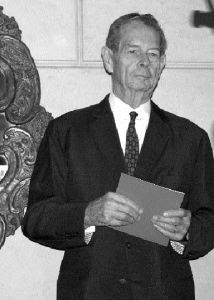
The Way It Goes Sometimes...
Patrick's TheoremIf the experiment works, you must be using the wrong equipment.
Skinners's ConstantThat quanity which, when multiplied times, divided by, added to, or subtracted from your answer,... gives you the answer you should have gotten.
Horners's Five Thumb PostulateExperience varies directly with equipment ruined.
Flagle's Law of the Perversity of Inanimate ObjectsAny inanimate object, regardless of its composition or configuration, may be expected to perform,... at any time,... in a totally unexpected manor, for reasons that are obsure or else completely mysterious.
Allen's AxiomWhen all else fails, read the directions.
The Spare Parts PrincipleThe accessibility, during recovery, of small parts which fall from the work bench, varies directly with the size of the part, and inversely with its importance to the completion of the work underway.
The Compensation CorollaryThe experiment may be considered a success if no more than 50% of the observed measurments must be discarded to obtain a correspondence with theory.
Gumperson's LawThe probability of a given event occuring is inversely proportional to its desirability.
The Ordering PrincipleThose supplies needed for yesterday's experiment must be ordered no later than tomorrow noon.
The Ultimate PrincipleBy definition, when you are investigating the unkown you do not know what you will find.
The Futility FactorNo experiment is ever a complete failure,... It can always serve as as a bad example.
Airplane LawWhen the plane you are on is late, the plane you want to transfer to is on time.
Allison's PreceptThe best simple-minded test of expertise in a particular area is the ability to win money in a series of bets on future occurrences in that area.
Anderson's LawAny system or program, however complicated, if looked at in exactly the right way, will become even more complicated.
Anthony's Law of ForceDon't force it, get a larger hammer.
Anthony's Law of the WorkshopAny tool, when dropped, will roll into the least accessible corner of the workshop.
Corollary – On the way to the corner, any dropped tool will first always strike your toes.
Army AxiomAny order that can be misunderstood has been misunderstood.
Axiom of the Pipe. (Trischmann's Paradox)
A pipe gives a wise man time to think and a fool something to stick in his mouth.
Baker's LawMisery no longer loves company. Nowadays it insists on it.
Barber's Laws of Backpacking1) The integral of the gravitational potential taken around any loop trail you choose to hike always comes out positive.
2) Any stone in your boot always migrates against the pressure gradient to exactly the point of most pressure.
3) The weight of your pack increases in direct proportion to the amount of food you consume from it. If you run out of food, the pack weight goes on increasing anyway.
4) The number of stones in your boot is directly proportional to the number of hours you have been on the trail.
5) The difficulty of finding any given trail marker is directly proportional to the importance of the consequences of failing to find it.
6) The size of each of the stones in your boot is directly proportional to the number of hours you have been on the trail.
7) The remaining distance to your chosen campsite remains constant as twilight approaches.
8) The net weight of your boots is proportional to the cube of the number of hours you have been on the trail.
9) When you arrive at your chosen campsite, it is full.
10) If you take your boots off, you'll never get them back on again.
11) The local density of mosquitos is inversely proportional to your remaining repellent.
Barth's DistinctionThere are two types of people : those who divide people into two types, and those who don't.
Boren's First LawWhen in doubt, mumble.
Brook's LawAdding manpower to a late software project makes it later.
Barzun's Laws of Learning1) The simple but difficult arts of paying attention, copying accurately, following an argument, detecting an ambiguity or a false inference, testing guesses by summoning up contrary instances, organizing one's time and one's thought for study – all these arts – cannot be taught in the air but only through the difficulties of a defined subject. They cannot be taught in one course or one year, but must be acquired gradually in dozens of connections.
2) The analogy to athletics must be pressed until all recognize that in the exercise of Intellect those who lack the muscles, coordination, and will power can claim no place at the training table, let alone on the playing field.
Forthoffer's Cynical Summary of Barzun's Laws1) That which has not yet been taught directly can never be taught directly.
2) If at first you don't succeed, you will never succeed.
Decaprio's RuleEverything takes more time and money.
Dijkstra's Law of Programming InertiaIf you don't know what your program is supposed to do, you'd better not start writing it.
Etorre's ObservationThe other line moves faster.
First Maxim of ComputersTo err is human, but to really screw things up requires a computer.
Gallois's RevelationIf you put tomfoolery into a computer, nothing comes back out but tomfoolery. But this tomfoolery, having passed through a very expensive machine, is somehow ennobled, and no one dares to criticize it.
Corollary – An expert is a person who avoids the small errors while sweeping on to the Grand Fallacy.
Glib's Laws of Reliability1. Computers are unreliable, but humans are even more unreliable.
Corollary - At the source of every error which is blamed on the computer you will find at least two human errors, including the error of blaming it on the computer.
2. Any system which relies on human reliability is unreliable.
3. The only difference between the fools and the criminal who attacks a system is that the fool attacks unpredictably and on a broader front.
4. A system tends to grow in terms of complexity rather than simplification, until the resulting unreliability becomes intolerable.
5. Self-checking systems tend to have a complexity in proportion to the inherent unreliability of the system in which they are used.
6. The error detection and correction capabilities of a system will serve as the key to understanding the types of error which they cannot handle.
7. Undetectable errors are infinite in variety, in contrast to detectable errors, which by definition are limited.
8. All real programs contain errors unless proven otherwise, which is impossible.
9. Investment in reliability will increase until it exceeds the probable cost of errors, or until somebody insists on getting some useful work done.
The Golden Rule of Arts and SciencesWhoever has the gold makes the rules.
Golub's Laws of Computerdom1. Fuzzy project objectives are used to avoid the embarrassment of estimating the corresponding costs.
2. A carelessly planned project takes three times longer to complete than expected; if carefully planned, it will take only twice as long.
3. The effort required to correct course increases geometrically with time.
4. Project teams detest weekly progress reporting because it so vividly manifests their lack of progress.
Goodin's Law of ConversionsThe new hardware will break down as soon as the old is disconnected and out.
Gordon's First LawIf a research project is not worth doing at all, it is not worth doing well.
Gray's Law of ProgrammingN+1 trivial tasks are expected to be accomplished in the same time as N trivial tasks.
Loggs Rebuttal - N+1 trivial tasks take twice as long as N trivial tasks for N sufficiently large.
Grosch's LawComputer power increases as the square of the costs. If you want to do it twice as cheaply, you have to do it four times as fast.
Halpern's ObservationThe tendancy to err that programmers have been noticed to share with other human beings has often been treated as if it were an awkwardness attendant upon programming's adolescence, which (like acne) would disappear with the craft's coming of age. It has proved otherwise.
Hoare's Law of Large ProgramsInside every large program is a small program struggling to get out.
Howe's LawEvery man has a scheme that will not work.
IBM
Pollyanna PrincipleMachines should work. People should think.
Laws of Computability as Applied to Social Science
1. Any system or program, however complicated, if looked at in exactly the right way, will become even more complicated.
2. If at first you don't succeed, transform your data set.
Laws of Computer Programming1. Any given program, when running, is obsolete.
2. Any given program costs more and takes longer.
3. If a program is useful, it will have to be changed.
4. If a program is useless, it will have to be documented.
5. Any given program will expand to fill all available memory.
6. The value of a program is proportional to the weight of its output.
7. Program complexity grows until it exceeds the capability of the programmer who must maintain it.
8. Make it possible for programmers to write programs in English, and you will discover that programmers cannot write in English.
9. Software is hard. Hardware is soft. It is economically more feasible to build a computer than to program it.
10. An operating system is a feeble attempt to include what was overlooked in the design of a programming language.
Law of Selective GravityAn object will fall so as to do the most damage.
Jenning's Corollary - The chance of the bread falling with the buttered side down is directly proportional to the cost of the carpet.
Lubarsky's Law of Cybernetic EntomologyThere's always one more bug.
Paperboy's rule of WeatherNo matter how clear the skies are, a thunderstorm will move in 5 minutes after the papers are delivered. (or after you just have washed your car).
Project scheduling "99" ruleThe first 90 percent of the task takes 10 percent of the time. The last 10 percent takes the other 90 percent.
Sattlinger's LawIt works better if you plug it in.
Segal's LawA man with one watch knows what time it is. A man with two watches is never sure.
Shaw's PrincipleBuild a system that even a fool can use and only a fool will want to use it.
Troutman's Programming Postilates1. If a test installation functions perfectly, all subsequent systems will malfunction.
2. Not until a program has been in production for at least six months will the most harmful error be discovered.
3. Job control cards that positively cannot be arranged in proper order will be.
4. Interchangeable tapes won't.
5. If the input editor has been designed to reject all bad input, an ingenious idiot will discover a method to get bad data past it.
6. Profanity is the one language all programmers know best.
The Unspeakable LawAs soon as you mention something,... if it's good, it goes away; if it's bad, it happens.
Weinberg's Law If builders built buildings the way programmers wrote programs, then the first woodpecker that came along would destroy society as we know it.
Corollary - An expert is a person who avoids the small errors while sweeping on to the Grand Fallacy.





























.jpg)

















